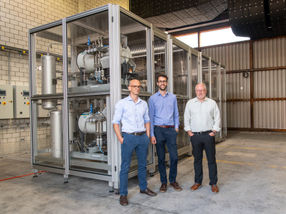Europe’s brightest and best contend for EuropaBio’s
EuropaBio’s first ever Most Innovative European Biotech SME Award has attracted an outstanding array of applications from 32 companies across 12 countries representing all sectors of the biotech industry. With such stiff competition, the panel of judges faced a tough task to identify the top five entries from which the overall winner will be announced at EuropaBio’s event on the Role of Biotechnology in Europe’s Responsible Innovation, in Brussels on 9 December. The winning applicant will receive a prize of €10,000 as well as two year’s free membership of EuropaBio.
Commenting on the shortlisted applicants, Tom Saylor, Chair of EuropaBio’s SME Platform said: “The top five finalists are each, in their own way, aiming to help us to live longer, healthier and greener lives. In creating this award we are seeking not only to raise awareness of the societal and environmental value of the work these enterprises are doing but also to reward the economic value brought by European Biotech SMEs who have developed sustainable business strategies, maximised the use of available funds for development and built and protected novel intellectual property”.
The finalists include Addex Pharmaceuticals, a company devoted to industrialising discovery and development of allosteric modulators as medicines to treat diseases of the central nervous system, inflammation and metabolic disorders; AMSilk, for creating a new class of biopolymers emulating the natural silk proteins produced by spiders on an industrial scale for many applications in fibres, coatings, and films for pharmaceutical, cosmetic, composite and technical textile applications; Keygene, for developing molecular breeding solutions to produce more efficient food, feed, fuel, fiber, flower and fun crops with a lower environmental footprint; Prosensa, focusing on the discovery, development and commercialisation of RNA (ribonucleic acid) modulating therapeutics targeting genetic disorders with a large unmet medical need, with a primary focus on neuromuscular and neurodegenerative life threatening disorders such as Duchenne Muscular Dystrophy, Myotonic Dystrophy, Huntington's disease and Spinal Muscular Atrophy, and TiGenix which exploits the power of Regenerative Medicine, using proprietary cell and biomaterials platforms, to develop durable therapies for the repair of damaged or diseased skeletal tissues such as cartilage, meniscus, ligaments and bone. The aim is a full restoration of the biological and mechanical functions of these tissues to prevent further degeneration of the joint and to halt the onset and progression of osteoarthritis.
Andrea Rappagliosi, EuropaBio Chairman and chair of the judging panel commented: “Europe is home to some hugely talented scientists and researchers, but it takes real drive, passion and personal commitment to also overcome the obstacles and barriers facing SMEs and to translate these gifts into solutions that benefit patients, consumers, society and our environment as a whole.”
Organizations
Other news from the department business & finance

Get the life science industry in your inbox
By submitting this form you agree that LUMITOS AG will send you the newsletter(s) selected above by email. Your data will not be passed on to third parties. Your data will be stored and processed in accordance with our data protection regulations. LUMITOS may contact you by email for the purpose of advertising or market and opinion surveys. You can revoke your consent at any time without giving reasons to LUMITOS AG, Ernst-Augustin-Str. 2, 12489 Berlin, Germany or by e-mail at revoke@lumitos.com with effect for the future. In addition, each email contains a link to unsubscribe from the corresponding newsletter.






















































